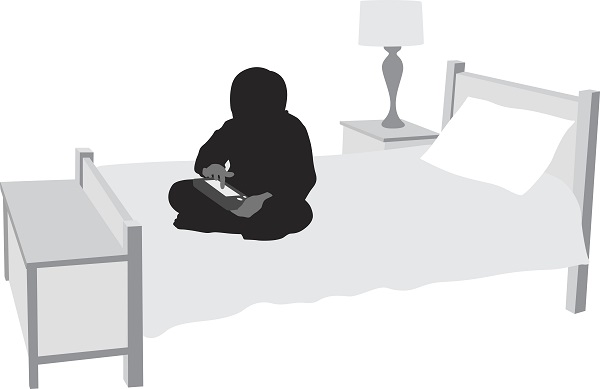Does Bedtime Media Use Harm Children’s Sleep? Only if They Struggle to Self-Regulate Behavior

Summary: New research reveals that media use before bedtime translates to less sleep for children who generally struggle to self-regulate their behavior. Children who scored high on measures of effortful control, however, were able to enjoy a restful night, regardless of their presleep media use.
Throughout the COVID-19 pandemic, one concern for many parents has been the impact of additional TV or computer screen time on their children and their already disrupted sleep habits.
According to a new study published in the journal Psychological Science, media use in the hour preceding bedtime impacts the sleep only of children who struggle to self-regulate their behavior. Frequent media use before bed in these children predicted later bedtimes and less sleep, but it had little impact on children who do well at self-regulating their behavior.
“Instead of parents wondering how to help their child better regulate their behavior, they can try to focus on creating more consistent sleep and media-use schedules.”
— Leah Doane (Arizona State University)
“Among kids who used the same amount of media in the hour before bed, we found differences that were explained by a personality characteristic called effortful control,” said Leah Doane, associate professor of psychology at Arizona State University (ASU) and senior author on the article. “Kids who score low on measures of effortful control are the ones who struggle to wait to unwrap a present or are easily distracted. We found a strong association between media use in the hour before bed and when these kids went to sleep and how long they slept. Media use before bed was not associated with the sleep of kids who scored high on measures of effortful control.”
The research team spent a week following 547 children between the ages of 7 and 9 years. The participants came from families that were socioeconomically diverse and lived in rural and urban areas. The parents kept daily diaries that tracked the children’s media use and sleep patterns. They also completed a survey that asked about their children’s temperament, including their ability to self-regulate behavior.
For the entire week, the children wore specialized wrist watches called actigraphs that tracked their movement and also ambient light. The actigraph data gave the research team detailed information about when and how long the children slept.
On average during the study week, the children slept 8 hours a night and used media before bed on 5 nights. Children who did not use media before bed during the study week slept 23 minutes more and went to bed 34 minutes earlier than children who used media most nights during the study week.
“Media use was generally associated with a shorter sleep duration, but this effect was most pronounced in children with low effortful control,” said Sierra Clifford, a research scientist at ASU and lead author on the article. “It also represented habitual media use rather than occasionally staying up late to watch a movie.”
“Media exposure mattered for the children who measured lowest in effortful control,” Clifford said.
Children with low effortful control might struggle with switching their attention from watching media before bed to calming down and falling asleep. But because effortful control is a personality characteristic, it is more difficult to change.
“Instead of parents wondering how to help their child better regulate their behavior, they can try to focus on creating more consistent sleep and media-use schedules,” Doane said.
This study was funded by the Eunice Kennedy Shriver National Institute of Child Health and Human Development. The data were from the Arizona Twin Project, which is led by ASU’s Kathryn Lemery-Chalfant, Mary Davis, and Doane.
# # #
APS is the leading international organization dedicated to advancing scientific psychology across disciplinary and geographic borders. Our members provide a richer understanding of the world through their research, teaching, and application of psychological science. We are passionate about supporting psychological scientists in these pursuits, which we do by sharing cutting-edge research across all areas of the field through our journals and conventions; promoting the integration of scientific perspectives within psychological science and with related disciplines; fostering global connections among our members; engaging the public with our research to promote broader understanding and awareness of psychological science; and advocating for increased support for psychological science in the public policy arena.
Psychological Science, the flagship journal of APS, is the leading peer-reviewed journal publishing empirical research spanning the entire spectrum of the science of psychology. For a copy of this article, “Effortful Control Moderates the Relation Between Electronic-Media Use and Objective Sleep Indicators in Childhood,” and access to other research in Psychological Science, contact news@psychologicalscience.org. Clifford, S., et. al, (2020) Effortful Control Moderates the Relation Between Electronic-Media Use and Objective Sleep Indicators in Childhood. Psychological Science, https://doi.org/10.1177/0956797620919432





APS regularly opens certain online articles for discussion on our website. Effective February 2021, you must be a logged-in APS member to post comments. By posting a comment, you agree to our Community Guidelines and the display of your profile information, including your name and affiliation. Any opinions, findings, conclusions, or recommendations present in article comments are those of the writers and do not necessarily reflect the views of APS or the article’s author. For more information, please see our Community Guidelines.
Please login with your APS account to comment.